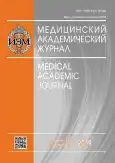PRENATAL STRESS IN PROGRAMMING OF IMMUNE AND NEUROENDOCRINE SYSTEM DEVELOPMENT
- Authors: Zakharova LA1
-
Affiliations:
- Koltzov Institute of Developmental Biology, Russian Academy of Sciences, Moscow
- Issue: Vol 19, No 1S (2019)
- Pages: 124-126
- Section: Articles
- Published: 15.12.2019
- URL: https://journals.eco-vector.com/MAJ/article/view/19360
- ID: 19360
Cite item
Abstract
The analysis of published and original data demonstrates that prenatal stress induced by viral and bacterial infection, or changes in the physiological concentrations of neurohormones in early ontogeny can cause unfavorable impacts on the development of neuroendocrine and immune systems. In early pregnancy bacterial infection simulated by lipopolysaccharide in an experiment activates the maternal immune system, which enhances the synthesis of pro- and anti-inflammatory cytokines in both maternal and fetal organisms. Consequently, cytokines promote the secretion of a hormonal cascade in the hypothalamic-pituitary-adrenal system, thus eliciting the hormonal response to stress. Various stress factors during critical periods of neuroendocrine and immune system development modulate the epigenetic mechanisms controlling specific genes, which can affect the structure and function of these systems and increase the risk of various pathologies in the offspring.
Full Text
About the authors
L A Zakharova
Koltzov Institute of Developmental Biology, Russian Academy of Sciences, Moscow
References
- Zakharova LA. Plasticity of neuroendocrine-immune interactions during ontogeny: role of perinatal programming in pathogenesis of inflammation and stress-related diseases in adults. Recent Patents on Endocrine, Metabolic & Immune Drug Discovery. 2009;3:11-27.
- Zakharova L. Perinatal stress in brain programming and pathogenesis of psychoneurological disorders. Biology Bulletin. 2015;42:12-20.
- Liverman CS, Kaftan HA, Cui L,Berman NE. Altered expression of proinflammatory and developmental genes in the fetal brain in a mouse model of maternal infection. Neurosci Lett. 2006;399:220-225.
- Girgis RR, Kumar SS, Brown AS. The cytokine model of schizophrenia: emerging therapeutic strategies. Biol. Psychiatry. 2014;75:292-299.
- Wang S, Yan JY, Lo YK. Dopaminergic and serotoninergic deficiencies in young adult rats prenatally exposed to the bacterial lipopolysaccharide. Brain Res. 2009;1265:196-204.
- Izvolskaia M, Sharova V, Zakharova L. Prenatal Programming of Neuroendocrine System Development by Lipopolysaccharide: Long-Term Effects. Int. J. Mol. Sci. 2018;19(11):e3695. https://doi.org/10.3390/ijms19113695.
- Mel’nikova VI, Izvol’skaia MS, Voronova SN, Zakharova LA. The role of serotonin in the immune system development and functioning during ontogenesis. Biology Bulletin. 2012;39(3):237-243.
Supplementary files







